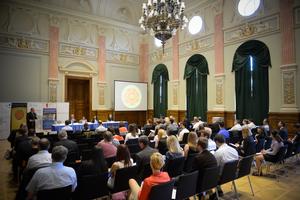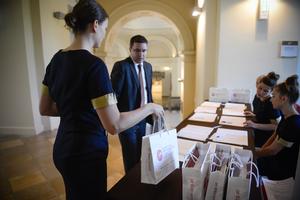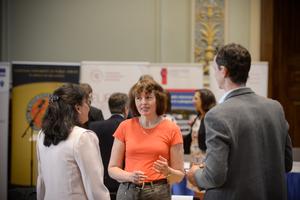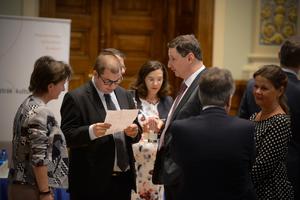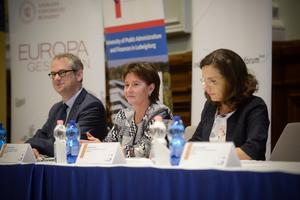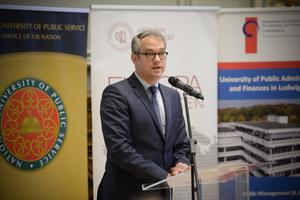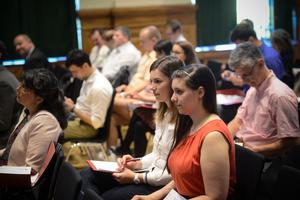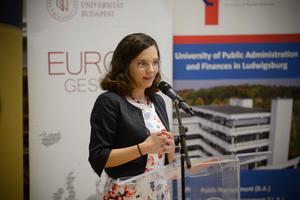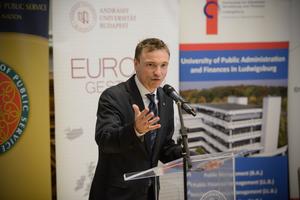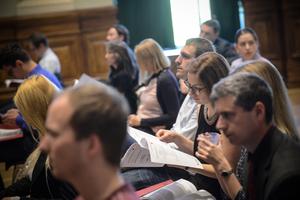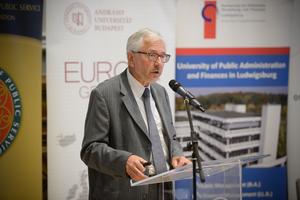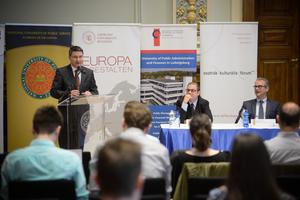The National University of Public Service hosted for the fifth time the CEE e-Dem and e-Gov event. The conference was organized with the cooperation of Andrássy University Budapest and the University of Public Administration and Finance of Ludwigsburg. During the two days event the participants discussed contemporary topics, such as smart cities, open data, data protecion, cybersecurity, transparency and digital citizenship.
On the first day, Mr. Tamás Szádeczky, professor of the Institute of E-Government of NUPS opened the event. He thanked the partner institutes for their help provided during the organisation of the event, which, after five years, has now become a tradition.
On behalf of the Management of NUPS, Dr. habil. Györgyi Nyikos, Vice-Rector for International Affairs welcomed the guests. She said that similarily to previous years, the number of participants has again reached more than 100 individuals and nearly 40 articles will be published after the event. She added that the high number of participants would facilitate the scientific exchanges on innovation and development. She also highlighted the importance of technological development and ICT in public administration, which can be best achieved through innovation and sharing of ideas. Their harmonization can ultimately serve as basis for a more efficient public service system, that can have a positive effect on the economy as well.
Following the speech of Dr. Nyikos, Mr. Georg Trautnitz, Vice-Rector of Andrássy University Budapest welcomed the participants. As he said, the Andrássy University Budapest represented a bridge between Hungary and German and other Eastern and Southeastern European institutions. He emphasized that one of the goals of the event was to present and discuss the widespread use of digital technologies, to learn from each other and to develop side by side. He added that the various topics highlighted the complexity of digitalisation and its many aspects, and that the changes raised a number of questions that need to be answered in order to achieve success. He further stressed that digitalization was a double-edged phenomenon. On the one hand, it provides great opportunities to enhance public administration but on the other hand, it also has its risks, namely the manipulation of information or the control of data flow. However, with cooperation, all actors of the digital world can reduce this risk exposure. He also noted that digitalization was not only important in public administration, but it was significant in the life of companies, organisations, educational institutions and societies as well.
All speakers of the opening ceremony agreed that digitalization was a decisive phenomenon of our time providing many new opportunities, to which we need to respond by implementing fresh ideas. This year several Austrian researchers arrived to the conference, which is also a good way to strengthen the scientific relations in the region.
Following the opening session, Mr. Rudolf Schicker, Priority Area Coordinator, PA10 EUSDR held his keynote speech. In his presentation, he said one of the major challenges of the EU Strategy for the Danube Region was to ensure the cooperation of the participating countries in order to respond timely to the regional opportunities and act more effectively according to that. He beleives that for having a better quality of living it is essential to assess the needs of the population and implement political and administrative reforms. To achieve this goal, ICT and a multi-level cooperation are having a key role. With the financial resources, innovative tools can be developed within the framework of larger projects to promote the concept of the digital city in the Danube region.
During the two-days event, the experts discussed the digitalization related topics, such as data protection, cyber security, innovation, smart cities and identity management, in different sections.
